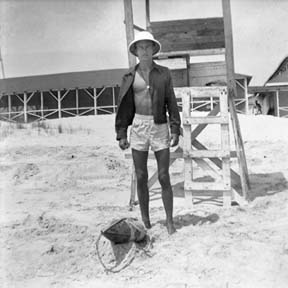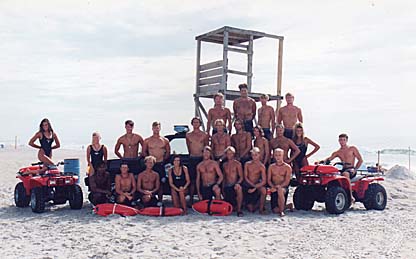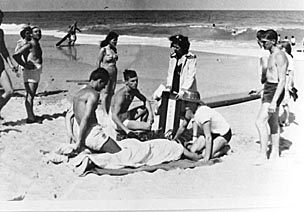Lifeguards of Wrightsville Beach
BY John Barnum Beausang
Since the incorporation of Wrightsville Beach in 1899 water safety has always been a chief concern. In fact securing beach patrol boats was the second action taken during the towns first meeting the first being an ordinance restricting the roaming of goats cows and pigs.
As the island grew in popularity the number of visitors increased. The summertime beach crowd grew and grew and the town had to improvise and adapt to the changing public safety needs. In 1902 lifelines 50 feet of spooled rope were placed in red boxes along the beach. By 1911 the town passed the first lifeguard ordinance requiring all hotels to employ an “active capable man” and a serviceable surf boat when patrons were swimming. By 1938 on behalf of the lifeguards the town approved the purchase of a Hawaiian surfboard capable of holding up to six people and in 1940 the town requisitioned four torpedo buoys two first aid kits reels rope floats and posts materials to construct a stand for the guards and a surfboard. With their own beachfront real estate secured the WB lifeguards aka: heroes were officially in business.
Accumulated over the last 70 years their stories and experiences are the stuff of legends. And more often than not the hardest thing to get them to do is wipe the Cheshire Cat-style grin off their face as they describe the best job in the world.
Hannah Block ’40-’49
Among Hannah Blocks myriad accomplishments she helped found the Azalea Festival and the Wilmington Historic Preservation Society has been Mayor Pro Tem of Wilmington recieved keys to the city of New York Raleigh and Wilmington raised a family served as a charter board member of the USO where she entertained troops as they ported in Wilmington she was the first female head lifeguard in North Carolina.
|
Photo courtesy of Cape Fear Museum of History and Science |
After taking all this in I ask “Is there anything you havent done?” She smiles shakes her finger at me and says “Theres always more to do.” I reckon this has been Hannahs mantra throughout life. I ask her about lifeguarding and the years melt away. Ninety-five years old becomes 26 years old and she talks about the war.
“When the boys left (for WWII) gaps needed to be filled. I filled those gaps.” In Carolina Beach Hannah gathered women and boys too young to go to war and trained them to rescue and to use lifesaving equipment. Hannah then did the same at Wrightsville Beach. Imagine Rosie the Riveter with a buoy and a Red Cross pith helmet. “Then ” she explains “when the boys came back someone had to train them so they could take over.”
George Clark ’45-’47
George began lifeguarding when he was 17. “Back then ” he says “there was no interview and no training that I can recall. You just went and talked to Police Chief Faircloth to be a lifeguard.”
George may downplay the screening process but he points out “We probably had more people on the holidays than maybe even today. There were five of us paid by the city $25 a week. One Fourth of July there was a big current. We pulled 35 to 40 people off the jetty in one day.”
George holds tremendous pride in having been a lifeguard. “We never had a person drown while I was a lifeguard at Wrightsville Beach.” I ask him about his friends from back then. He rubs his hands together and smiles. “The guys I met while I was a lifeguard were lifelong friends. Although theyre all gone now.”
Bill Hummel ’54
 “It wasnt as glamorous as Baywatch ” Bill tells me immediately. “They gave us a bathing suit a hat and a whistle. I repaired the hat and painted it myself. We didnt have radios or walkie-talkies. We just ran to where there was trouble.”
“It wasnt as glamorous as Baywatch ” Bill tells me immediately. “They gave us a bathing suit a hat and a whistle. I repaired the hat and painted it myself. We didnt have radios or walkie-talkies. We just ran to where there was trouble.”
He remembers the time fondly and talks about how much the area has changed some for the better some for the worse. “We didnt have drug problems or alcohol problems to deal with like later guards. We were just there if people got in trouble in the water. Chief Williamson didnt mess around. If people got out of line they got to know what our jail was like.”
I ask him if he remembers how much it paid. He responds “It was very low pay but you could have all the girls you could keep.”
Karl Allen ’60-’62
“You couldnt get a better job ” Karl says. “They didnt pay but $40 a week but it didnt matter to us. We got one day off a week and one overnight at the beach at the lifeguard shack in case there was an emergency overnight.
“It wasnt uncommon ” he recalls “jumping off the pier to get someone especially during a Noreaster. Sometimes to get them off the piling you had to hit them on the head with the buoys.” On one Fourth of July weekend he tells me they pulled 73 people out of the water at Johnny Mercers Pier.
Karl laughs “I remember I was sitting at a lifeguard stand at Lumina Pavilion and a whole family from Raleigh spread out their blankets close to the lifeguard stand. It was this older guy his wife and about 4 children. He pulled out a quart of Quakerstate and wiped the whole family down in motor oil. That was the damnedest thing Ive ever seen in my whole life. The sun shone right through so they burned red.”
Jim Ayers ’69-’71
Jim was the first lifeguard ever to be sworn in as a policeman. He worked for Chief Millard Everett “Stinky” Williamson earning $300 per week. Littering was a big issue then. “People came to the beach started a bonfire and left all their trash ” he says. “Wed come out in the mornings to bottles and cans everywhere.” Lifeguards had to enforce littering laws on the beach as part of their duties.
He cant forget the first time he saw someone die on the beach. “A boy maybe 17 came to the beach with his friends and brothers just north of Crystal Pier. He was a non-swimmer. He was out in the water up to his waist and stepped in a hole. I got the call. I was in the Bronco and got there two to three minutes later. I saw him go over the top of a wave went out got him and began CPR. He was gone. We worked on him for 10 to 15 minutes but he was just gone.”
I ask Jim about the guys from back then. “We dont look like we used to.” He laughs. “But I can still see the look in their eyes when we remember rescues.”
Brad Walls ’73-’77
Brad guarded with a number of local boys and says it was the best time of his life. “It was like a band of brothers ” he tells me. “We took pride in keeping the beach safe.”
He recalls a citizens rescue of a child that went awry. “One Sunday afternoon we got a call about a child that fell off Mercers Pier. A man jumped in to help. He clung to the pier with the kid on his shoulders. I swam out and got them. When I was halfway in I looked back and his eyes had rolled back. He had had a heart attack. When we got to the beach I started CPR. One of the first things about administering CPR is to establish an air canal. So we opened his mouth and he immediately swallowed his false teeth. We looked at each other and said That cant be good but he eventually made it. I dont know about the teeth though.”
Jim Arnold ’73-’76
For Jim being a lifeguard in the 70s was incredible and memorable. “It was a very maturing experience from some of the rescues and situations I witnessed ” he tells me. “The most important piece I can tell you about lifeguarding is that when we were in the towers on the clock it was nothing but business. We took our jobs as serious then in the 1970s as they do today. It was a tremendous amount of fun and a tremendous amount of responsibility.”
He says “Everyone thinks guards are absolute wild men and it is a lot of fun to be a guard. But the flipside is theres a tremendous amount of weight you put on yourself standing in that tower overlooking thousands of people grouping heads and trying to keep track of all the little children in the surf. Thats your job.”
Axel Erkes ’78-’82
Axel and both of his older brothers George and Eddie grew up on Wrightsville Beach and were WB lifeguards. The Erkes boys are one of the many families who guarded along our beaches. However Axel didnt get any special treatment. “George wouldnt hire me. I was 17 and you had to be 18. He was head lifeguard but he wouldnt cut his brother a break.” The next year he made the squad and made $2.50 per hour.
At the time the big problem was the surf regulations. “Back then all surfers had to be out of the water by 10 a.m. And if the waves were good we spent a ton of time getting them out because everyone wanted to surf when the waves were good. It was an enormous waste of time. Now theyre a great second line of defense and they work with the Ocean Rescue.”
Like many of the other guards I spoke with Axels training stays with him. “Im always looking. I have to pay attention to my kids and other people in the water. There are many times Ill jump up to make sure someones okay. Thats something you never stop feeling.” In fact Axels experience came in handy. “Years later I had to use CPR at a car wreck ” Axel tells me. “A man was having a heart attack and I performed CPR on him. The training never leaves you.”
Leilani Tootoo Balaban ’89-’93
 “Some years I was the only woman on the squad ” Leilani tells me. “I felt like I had to try harder. I had to keep up with the boys.”
“Some years I was the only woman on the squad ” Leilani tells me. “I felt like I had to try harder. I had to keep up with the boys.”
She explains that prevention was a huge part of their job. “If it was dangerous wed put up the red flags and tell people this is not the day to go swimming. We had several measures in place. When there is a save situation everything you have goes into it. Its a life or death situation. You have to be focused and are constantly tested.”
Leilani loved being a guard and says if she could do it now she would. “Everyone knew who you were. You were respected in town. Families would come to the beach for the summer and adopt you and appreciate you.”
Todd Bostian ’88-’95 ’90-’95 as head lifeguard
Todd was part of the “Baywatch Era ” in which David Hasselhoff and Pamela Anderson portrayed lifeguards on television. “Every week when someone would get sucked out at low tide ” Todd says “wed have to swim out there and get them. It took a lot of time to get out there and back in. I was watching that show and I wasnt really happy with the way they portrayed giving people CPR and stuff but I did like how they used wave runners for rescues. It gave us an idea that we need some type of wave runner or boat to help this situation. We presented the idea to WB and in 1995 they got us one.
“There were some months I worked seven days a week and didnt mind it.” Todd says. “The best life lessons Ive learned came from that time on the beach. It was the best time of my life.”
Brian Puskas ’90-’92
I start off asking if any rescues stick out in his mind. “We were hauling the four-wheelers when we got a call that a Hobie Cat turned over toward the causeway bridge. We ran out there and found them by the Blockade Runner. There was lightning striking everywhere and we pulled in four or five people and the boat.”
At the time Baywatch was big and you could get “lifeguard” t-shirts at Wings. “We went to the city and said We want to be called Ocean Rescue not lifeguards. It was more professional. This is not a job for a clown. We take this seriously. If you are in the water anywhere at Wrightsville Beach you are our responsibility.” The town agreed and renamed the squad Ocean Rescue.
Kristin Smith ’07-present
Ironman. Triathlete. Personal trainer. Kristin is the epitome of the modern lifeguard. “The more fit you are the better able to respond to certain situations especially in situations where you have to pull in two people. In just about every situation Im in I have to pull in someone who is double my body weight.”
I ask her what its like to rescue someone. “Youre nervous on your first rescue ” she says “youre wondering whats going to happen and then when its over you think it wasnt that bad. But then you have crazy stuff going on like boats going over. Doing that two weeks of training was harder than most rescues. So when someone needs help youre there. Or before someones in trouble youre already there.”
Dave Baker Ocean Rescue Director
Since Daves arrival in November 2004 he and head lifeguard Jeremy Owens have professionalized the Ocean Rescue system by putting all the equipment on a rotation basis and into the budget. He explains “It is an emergency service. Its not a fly-by-night operation. It is a part of the fire department. Jeremy (Owens) and I are firefighters. We are EMTs. Not only can we make the water rescues but we can fight fires and tend to your medical needs.”
Today a lifeguard has completed over 90 hours of training before he or she ever gets in the position to protect the public. “By the time a guard makes their first save after our training its probably the easiest thing theyve done in two weeks ” Dave says.
Special thanks to Skipper Funderberg Peter Fritzler and the Wrightsville Beach Museum.
